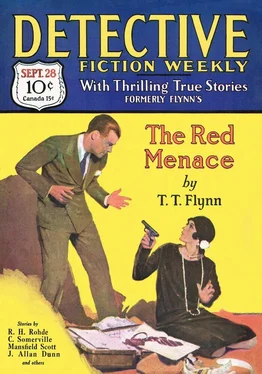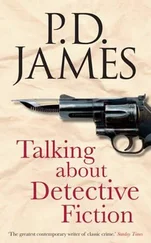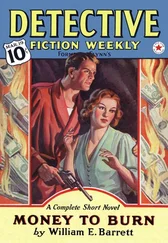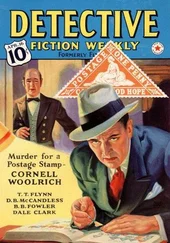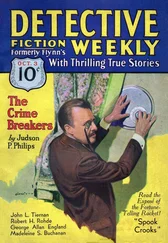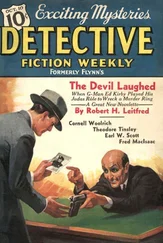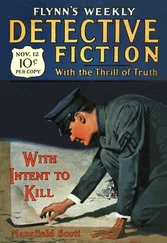Джон Данн - Detective Fiction Weekly. Vol. 44, No. 5, September 28, 1929
Здесь есть возможность читать онлайн «Джон Данн - Detective Fiction Weekly. Vol. 44, No. 5, September 28, 1929» весь текст электронной книги совершенно бесплатно (целиком полную версию без сокращений). В некоторых случаях можно слушать аудио, скачать через торрент в формате fb2 и присутствует краткое содержание. Город: New York, Год выпуска: 1929, Издательство: Red Star News Company, Жанр: Детектив, на английском языке. Описание произведения, (предисловие) а так же отзывы посетителей доступны на портале библиотеки ЛибКат.
- Название:Detective Fiction Weekly. Vol. 44, No. 5, September 28, 1929
- Автор:
- Издательство:Red Star News Company
- Жанр:
- Год:1929
- Город:New York
- ISBN:нет данных
- Рейтинг книги:4 / 5. Голосов: 1
-
Избранное:Добавить в избранное
- Отзывы:
-
Ваша оценка:
- 80
- 1
- 2
- 3
- 4
- 5
Detective Fiction Weekly. Vol. 44, No. 5, September 28, 1929: краткое содержание, описание и аннотация
Предлагаем к чтению аннотацию, описание, краткое содержание или предисловие (зависит от того, что написал сам автор книги «Detective Fiction Weekly. Vol. 44, No. 5, September 28, 1929»). Если вы не нашли необходимую информацию о книге — напишите в комментариях, мы постараемся отыскать её.
Detective Fiction Weekly. Vol. 44, No. 5, September 28, 1929 — читать онлайн бесплатно полную книгу (весь текст) целиком
Ниже представлен текст книги, разбитый по страницам. Система сохранения места последней прочитанной страницы, позволяет с удобством читать онлайн бесплатно книгу «Detective Fiction Weekly. Vol. 44, No. 5, September 28, 1929», без необходимости каждый раз заново искать на чём Вы остановились. Поставьте закладку, и сможете в любой момент перейти на страницу, на которой закончили чтение.
Интервал:
Закладка:
Detective work in large part is dreary business. It is very much of a waiting game. He who cannot school himself to infinite patience would find the profession intolerable. Only the big game hunter can have a sympathetic understanding of the fascination of the work which keeps a spirit of eagerness awake in man-hunters through long, monotonous sterile periods of watchful waiting.
In this case there was six weeks of it, day and night, before action came.
Burgess, shadowing the hotel where Connecticut Blackie and Bugs Reilly lived, saw Bugs leaving it one afternoon about four o’clock. Blackie accompanied him as far as the lobby. Burgess noted that the older crook’s words at the parting were swiftly and decisively spoken. What interested the detective even more was that which dangled from Bugs’s right hand. Dangle is hardly the word. It was a satchel of costly black leather, and it hung heavily. In fact, its weight caused him to put it down on the floor until Blackie’s talk ended. When he picked the satchel up again it required a sturdy heft of his shoulders to lift it. And Bugs lost no time in engaging a taxi on leaving the hotel. In another cab Burgess, of course, followed. The trip ended at the depot of the Delaware, Lackawanna and Western Railroad. There Bugs made straight for the parcel room, heaved the heavy satchel on the counter and checked it. He made no purchase of a railroad ticket at the time, but returned again by taxi to the hotel.
In following Bugs, Burgess had not left Blackie unwatched. Detective Charles Flaherty remained to hold Blackie under espionage. When Bugs rejoined his pal, Burgess consigned the two of them to Flaherty and returned to the Delaware, Lackawanna and Western Railroad station and to the package room. There a show of his shield quickly obtained him the privilege of examining the bag Bugs had deposited there. He shook it and the jangle of metallic contents gave him a thrill. A kit of burglar tools doubtless. The newly formed trio, with the masterful Liverpool Jack in command, were, in all probability, planning an out of town trick.
He wished he might look into the bag and confirm the ring of metal that had come out of it. But he dared not tamper with the lock, he figured. It would advertise to Bugs of a certainty that strange hands had been upon his possession. Still, there was the possibility that the bag hadn’t been locked. It was worth testing. Burgess tried the catch, and smiled. The bag was open! Greater his satisfaction when full confirmation of his deduction presented itself. Brace and bit, hammer and chisel, soap and “soup” — nitro-glycerine — in vials in sufficient quantity to wreck the entire railroad station if it exploded — he found in Bugs Reilly’s bag. But the vials were packed well in pads of cotton and waste, so that Burgess had no misgiving in allowing them to remain where they were.
Trailing Bugs back to his New York hotel, Burgess sent swift word to Fitzpatrick, watching Liverpool Jack at his uptown home. He left Flaherty at the hotel long enough to get Fitzpatrick on the secret wire of the branch bureau at the West Forty-Seventh Street station by means of the policeman on post in the vicinity of Liverpool Jack’s apartment.
“Looks like a job to-night, Fitz,” he said, “so don’t let Liverpool slip you. Bugs checked a safe-breaking kit over at the Delaware and Lackawanna this afternoon. Yes — sure. He left it unlocked and I got a good full peek into it. All the works there. No, I don’t know where they fix to pull the job. He didn’t buy any ticket. But Flaherty and I have got both Blackie and Bugs covered down here. I’m only guessing that it’s to-night they are fixing on. But it looks good. He’d hardly be taking the tools to leave in a public checking room for any length of time. I’d say they meant to use ’em right away. Well, keep your eyes on Liverpool.”
Shortly after eight o’clock that night Bugs Reilly again left the hotel. Burgess, of course, went after him. Again Bugs taxied to the Delaware, Lackawanna and Western Railroad station. This time he made for the ticket office and bought a ticket. He consulted the station clock, comparing it with his watch, and apparently decided there was ample time left in which to board his train, for he went to a newsstand and began looking over the magazines.
When Burgess was certain Bugs was taking no further interest in the ticket window he made his own appearance there and quickly elicited, by describing the purchaser, that Bugs had bought a ticket for the fashionable autumn and winter resort of Lakewood, New Jersey. He promptly supplied himself with a ticket to the same place. Bugs waited till within a few minutes of train time before presenting his check and recovering the kit of vault-cracking tools. Bugs traveled high, having a conductor assign him to a Pullman seat when he boarded the train.
Burgess, who couldn’t be sure that he may not have been pointed out as a detective to Bugs by some fellow crook at one time or another, dared not engage for himself the same luxury. He rode in the common smoker.
There were many stops, and, of course, at each he alighted from the train to see that Bugs didn’t steal a march on him in that way. Especially was he careful to do this, for it is an old trick of criminals to get off a train at a station before or a station beyond a town or city in which they mean to commit a crime. This is done for the purpose of beclouding possible identification by trainmen. Criminals traveling in pairs or trios or quartets frequently get off at different stations so that they will not be grouped in the mind’s eyes of conductors and brake-men.
But Bugs tried no tricks. At least, not on the journey to Lake wood. He rode the full length of the ride. And Burgess, elation still running high, loitered after him as he left the station. It was not policy to place himself too closely at the heels of his quarry, of course. He allowed Bugs a good two to three hundred feet of leeway ahead. But as Burgess came to a crossing ill-luck suddenly befell. Four huge lorries headed with milk for New York hove around a turn and halted Burgess while Bugs had escaped the delay.
When the lorries passed Bugs was gone!
This way and that Burgess looked, hurrying his steps, but man and bag had completely disappeared. Burgess ran from block to block peering down the side streets. No Bugs!
And yet, supposing that Bugs knew he was being followed, supposing Burgess had been identified as a detective to Bugs and that Bugs had caught sight of him at the Delaware, Lackawanna and Western Railroad station, or on the train, Bugs could not have done any tall running himself, burdened as he was with a bag full of heavy steel instruments and hampered as well by the caution the presence of nitro-glycerine in the kit made imperative. The implements themselves were all securely held in the bag by strap insets, but there was the danger of a trip and fall as he ran.
Burgess then became certain that if Bugs had gone ahead he must have caught up to him. Somewhere between the station and the place he now stood Bugs must have picked a place of concealment. It was possibly a prearranged place of hiding in some saloon near the station.
So the detective went back over the ground he had already covered. There were several saloons and lunch places in the vicinity of the depot, but these he looked into without result. Bugs had evaporated. Somewhere in the immediate neighborhood, Burgess then bethought him, the mob might have a local accomplice and that to his flat or house Bugs had gone awaiting the arrival of his masters, Liverpool Jack and Connecticut Blackie.
Somewhat was Burgess’s chagrin ameliorated by the thought of the last two criminals being securely under the espionage of his side-kick, Fitzpatrick, aided by Flaherty. After all, what was there to worry about? Bugs was only the underling, the toter of the tools. The expert, the actual performers, had to get on the job before anything could happen, any crime be committed. Fitzpatrick and Flaherty would be on the heels of the adepts, and this would lead them to the place where Bugs was to make rendezvous with them, the place to which he had so suddenly and blankly disappeared. His own job would be to pick up Fitzpatrick and Flaherty. He and Bugs had arrived on the next to the last train which would come to Lakewood that night. They had got in at eleven; there’d be another train at midnight.
Читать дальшеИнтервал:
Закладка:
Похожие книги на «Detective Fiction Weekly. Vol. 44, No. 5, September 28, 1929»
Представляем Вашему вниманию похожие книги на «Detective Fiction Weekly. Vol. 44, No. 5, September 28, 1929» списком для выбора. Мы отобрали схожую по названию и смыслу литературу в надежде предоставить читателям больше вариантов отыскать новые, интересные, ещё непрочитанные произведения.
Обсуждение, отзывы о книге «Detective Fiction Weekly. Vol. 44, No. 5, September 28, 1929» и просто собственные мнения читателей. Оставьте ваши комментарии, напишите, что Вы думаете о произведении, его смысле или главных героях. Укажите что конкретно понравилось, а что нет, и почему Вы так считаете.
